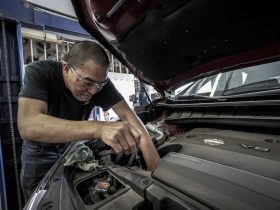One of the least appreciated benefits of owning a car is that you and your family have at hand one of the most important resources you will need if faced with a major emergency. From personal emergencies like the need to quickly transport a loved one to the hospital, to regional emergencies like the need to quickly evacuate because of a fire, flood, tornado, or other natural disasters, the first thing you want to depend on is a reliable and ready automobile.
Prior planning prevents poor performance, and the defining characteristics of an emergency are that the timing of it will be unexpected and simultaneously we want to ensure that we respond well. Having a plan for emergencies involving your car starts with understanding your circumstances and asking good questions. Do you have a spouse with a medical condition and the closest health care facility is far away? Do you live in a location that is at risk from a wildfire or tsunami? Are you close to an industrial facility that could be the source of an accident involving toxins? Your situation should influence what you include in a basic emergency kit. Here are three more ways to be prepared for the worst:
Tires and Maintenance
One of the most common causes of automobile accidents is tire failure. In an emergency, there is a high chance that you will need to drive in ways or in conditions that increase the stress placed on your tires. Putting off replacing tires and other basic maintenance will leave you at greater risk in the case of a real emergency. If the cost of a new set of tires is a barrier, learn how to purchase with a tire or wheel payment plan.
Fuel and Supplies
The commonsense advice to always keep at least a quarter of a tank of gas in your car is most relevant during emergencies. Long lines at gas stations during evacuations are a staple of media coverage and often fuel is entirely unavailable. Homeowners who have a garage or other location for safely doing so should keep a store of automobile-quality gasoline in safe containers and replace it regularly. Also make sure that basic car supplies like motor oil, water bottles, and non-perishable food are all checked and refreshed as needed.
Passengers and Pets
An emergency is a time when you are most likely to be transporting more than just yourself. It could be an injured passenger, all of your children, neighbors without their own transportation, and family pets. You need to make sure that everyone can be safely accommodated in your vehicle without a lot of rearranging. It is good to keep your car clear of clutter and to always leave installed car seats and other safety equipment that is only used occasionally so that nothing needs to be reconfigured in an emergency. Pets require special consideration, as they will likely already be agitated. Having pet travel accessories such as crates and gates ready to go will save crucial time.
In an emergency, your car can make the difference between safety and tragedy. Have it ready to go and you’ll be investing in your own well-being.







